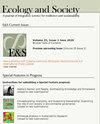保护区包容性保护的杠杆点和杠杆
IF 3.2
2区 社会学
Q1 ECOLOGY
引用次数: 0
摘要
面对第六次生物多样性大灭绝,在改善人类福祉的同时有效保护生物多样性的包容性保护方法正受到越来越多的关注。尽管对包容性保护治理的理论研究较多,但对其实践实施的实证研究仍是迫切需要的。本文采用相关网络分析方法,并借鉴了世界自然保护联盟(IUCN)网络平台上263个地点的经验结果,归纳出了保护区和保护区的全球保护结果集群。这些集群代表了五个保护焦点或原型,即(i)基于社区的保护,(ii)可持续管理,(iii)冲突解决,(iv)多层次和共同治理,以及(v)环境保护和自然对人类的贡献。我们的实证方法进一步揭示,包容性保护的某些维度作为成功管理与这些集群相关的保护区的杠杆点至关重要,即改善社会文化背景和社会凝聚力,提高青年、妇女和少数民族的地位和参与,改善人类健康,赋予当地社区权力,或重建对话和信任。我们强调包容性干预措施,如教育和能力建设,发展联盟和伙伴关系,实现可持续生计,或由土著人民和当地社区或私人行为体领导的治理安排,作为促进保护区社会生态系统积极转变的杠杆。我们认为,尽管我们确定的一些杠杆点在当前的保护区管理中不太有针对性,但它们可以代表强有力的干预领域,以增强保护区的社会和生态成果。本文章由计算机程序翻译,如有差异,请以英文原文为准。
Leverage points and levers of inclusive conservation in protected areas
Inclusive conservation approaches that effectively conserve biodiversity while improving human well-being are gaining traction in the face of the sixth mass extinction of biodiversity. Despite much theorization on the governance of inclusive conservation, empirical research on its practical implementation is urgently needed. Here, using a correlation network analysis and drawing on empirical results from 263 sites described on the web platform of the PANORAMA initiative (IUCN), we inductively identified global clusters of conservation outcomes in protected and conserved areas. These clusters represent five conservation foci or archetypes, namely (i) community-based conservation, (ii) sustainable management, (iii) conflict resolution, (iv) multi-level and co-governance, and (v) environmental protection and nature’s contribution to people. Our empirical approach further revealed that some dimensions of inclusive conservation are crucial as leverage points to manage protected areas related to these clusters successfully, namely improvements in the socio-cultural context and social cohesion, enhancing the status and participation of youth, women, and minorities, improved human health, empowerment of local communities, or reestablishment of dialogue and trust. We highlight inclusive interventions such as education and capacity building, development of alliances and partnerships, and enabling sustainable livelihoods, or governance arrangements led by Indigenous peoples and local communities or private actors, as levers to promote positive transformations in the social-ecological systems of protected areas. We argue that although some of the leverage points we identified are less targeted in current protected area management, they can represent powerful areas of intervention to enhance social and ecological outcomes in protected areas.
求助全文
通过发布文献求助,成功后即可免费获取论文全文。
去求助
来源期刊

Ecology and Society
环境科学-生态学
CiteScore
6.20
自引率
4.90%
发文量
109
审稿时长
3 months
期刊介绍:
Ecology and Society is an electronic, peer-reviewed, multi-disciplinary journal devoted to the rapid dissemination of current research. Manuscript submission, peer review, and publication are all handled on the Internet. Software developed for the journal automates all clerical steps during peer review, facilitates a double-blind peer review process, and allows authors and editors to follow the progress of peer review on the Internet. As articles are accepted, they are published in an "Issue in Progress." At four month intervals the Issue-in-Progress is declared a New Issue, and subscribers receive the Table of Contents of the issue via email. Our turn-around time (submission to publication) averages around 350 days.
We encourage publication of special features. Special features are comprised of a set of manuscripts that address a single theme, and include an introductory and summary manuscript. The individual contributions are published in regular issues, and the special feature manuscripts are linked through a table of contents and announced on the journal''s main page.
The journal seeks papers that are novel, integrative and written in a way that is accessible to a wide audience that includes an array of disciplines from the natural sciences, social sciences, and the humanities concerned with the relationship between society and the life-supporting ecosystems on which human wellbeing ultimately depends.
 求助内容:
求助内容: 应助结果提醒方式:
应助结果提醒方式:


